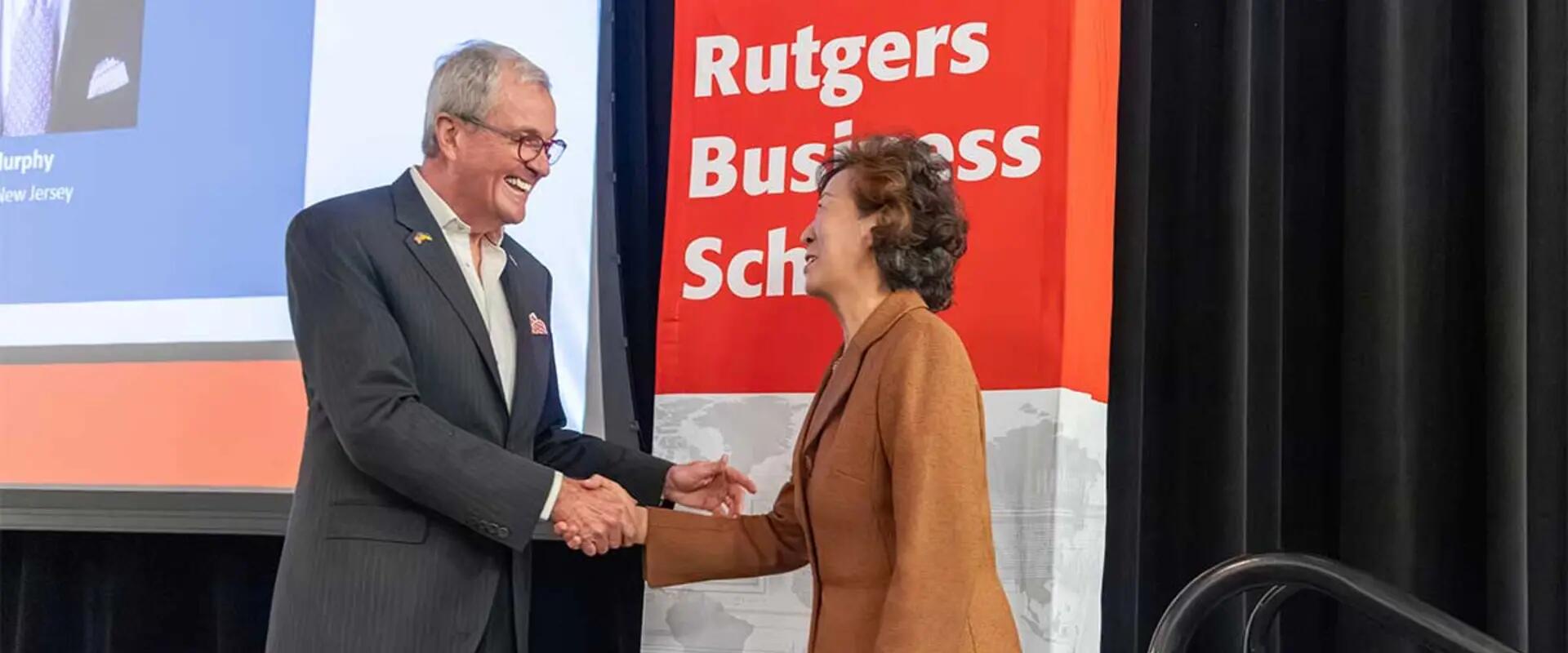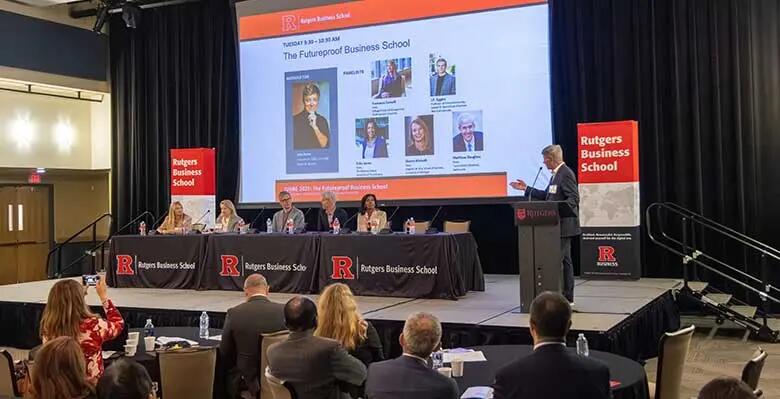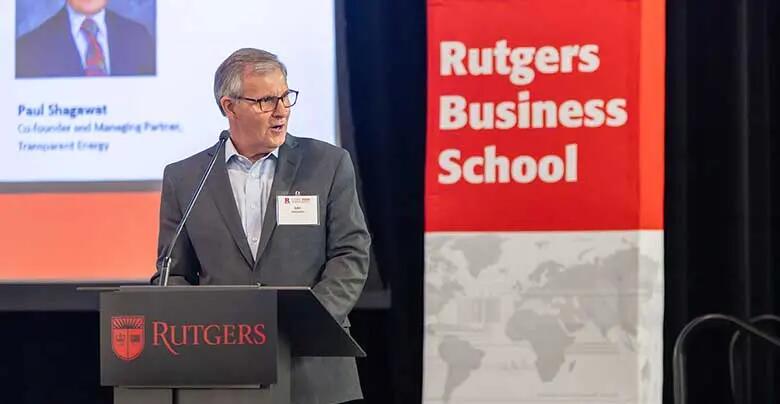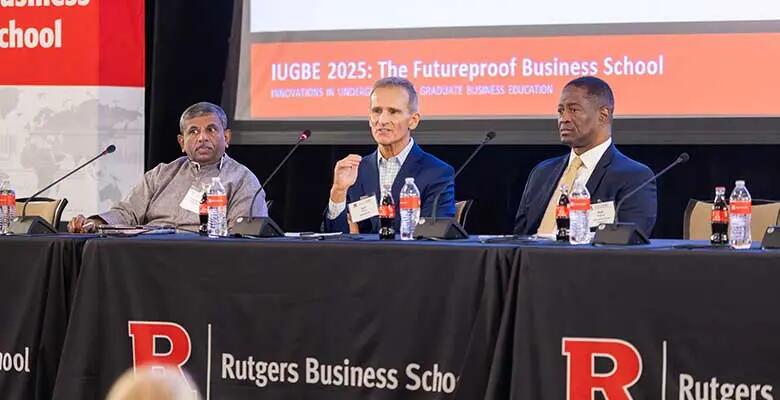
Gov. Phil Murphy takes the podium after being introduced by Dean Lei during the IUGBE Conference.
Deans from across the country share views on training students for future business world
The race to understand and teach AI and the challenge of preparing students for jobs that don’t exist yet were among the topics discussed during Rutgers Business School’s Innovations in Undergraduate and Graduate Business Education Conference.
The conference – The Futureproof Business School – attracted nearly 200 people, many of them business school deans and faculty from across the country. Rutgers Business School Dean Lei Lei has hosted the conference seven times as a way of fostering collaboration and inspiring innovation. Among this year’s speakers was New Jersey Gov. Phil Murphy.
In addition to remarks from Gov. Murphy, the three-day conference featured 10 panel discussions, including deans, former deans and faculty from the country's leading business schools. Several panels included CEOs as well as Rutgers Business School MBA alumni.
The complexity and variety of issues facing higher education leaders became evident as the conference opened with a conversation led by John Byrne, founder and editor of Poets&Quants who has studied higher ed through a journalist's lens for decades. He predicted more uncertainty for higher education.
“We are going to see more conflict, more friction, more challenges for higher education,” he said. “We are all in the throes of disruptive change.”
AI is high on the list among the challenges. “There’s no question employers want this,” Bryne said. “This is that big, that essential.”
Byrne also moderated the first panel discussion of the conference, posing this question to panelists: “What does it mean, futureproof?” The panelists included Erika James, dean of the Wharton School; J.P. Eggers, professor of entrepreneurship at Stern School of Business; Matthew Slaughter, dean at the Tuck School of Business; Sharon Matusik, dean of the Ross School of Business; and Kellogg School of Management Dean Francesca Cornelli.

The panel’s responses focused on relevancy, taking advantage of a time of uncertainty to innovate, and ensuring that students are being offered something deeper than the traditional business school education. But the panelists also mentioned the need for community, creativity and the critical role of faculty.
Kellogg’s Dean Cornelli acknowledged the difficulty of keeping pace with the speed of changes taking place, AI, specifically. “Four or five years from now, the things we’re doing will be obsolete,” she said.
During the first day, both deans and business executives described the demand for knowledge about AI. Faculty are challenged to teach it, students are expected to learn it, and companies are eager to put it to use. “We don’t have it all figured out,” Slaughter said in response to a question from Byrne.
Other panelists predicted that every subject area will eventually include a component of AI. One dean suggested that pairing undergraduates with professionals studying in Executive Education programs might be a more practical way of teaching AI, giving the younger students a chance to apply their AI knowledge and skills to real problems.
James, Wharton’s dean, suggested that academic research is “paramount” to influence the use of the technology in industry. “Business leaders don’t know any more than we do now about how AI will affect employment,” she said.

Len DeCandia, former chief procurement officer at Johnson & Johnson and Rutgers Business School MBA alumnus, moderated a panel that brought the perspective of company executives into the discussion about AI and other skills they considered “non-negotiable” in new hires.
Mark Ferguson, founder and CEO of Innervation Finance Group, said he expects new employees to be able to think on their feet, not only interpret data, but to be able to create a narrative around it and “stand by” it.
“We used to want to hire analysts, people who could use data to make decisions, but now we want people who can also ask questions and test the models,” Ferguson said.

In addition to Ferguson, the panel was composed of Arun Kumar Bhaskara-Baba, former global chief digital and information officer of Honeywell’s Aerospace Technologies Division; Robert Falzon, former vice chair of Prudential Financial.
Arun predicted that in the next three to five years, 45% of administrative work will be handled by AI agents in the workplace. The panelists suggested that students needed to work with AI in the classrooms to solve real business problems.
Falzon agreed. “I would not underestimate the revolutionary impact AI will have,” he said.
In his remarks, Gov. Murphy, who spent a career on Wall Street and earned an MBA from Wharton, spoke about the advantage that business knowledge gave him leading New Jersey. “A business school education has enormous relevance in public service,” he said.
Murphy also acknowledged the role that Rutgers University and Rutgers Business School will have key roles in “unlocking innovation” through translational research hubs like the one being developed in New Brunswick. “Our state’s economic strategy can be summed up by an old adage,” Murphy said, “the best way to predict the future is to create it.”
-Susan Todd
Press: For all media inquiries see our Media Kit


